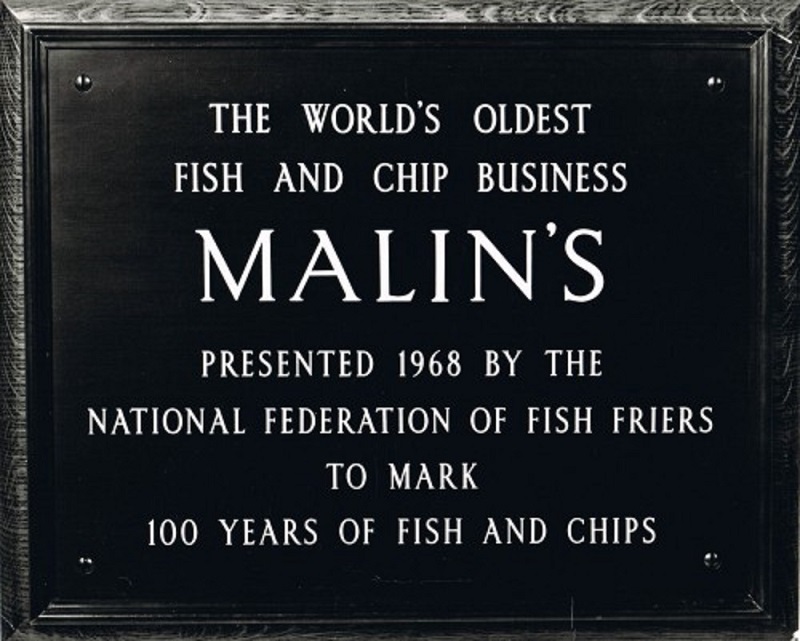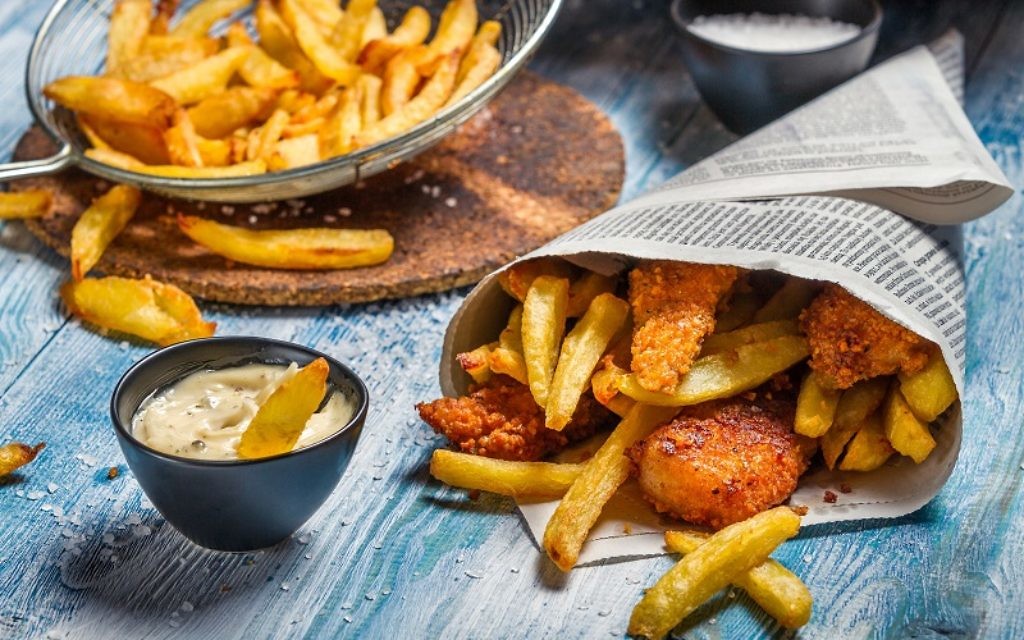The Best of British Takeaways: Our plaice in fish-tory
The first episode of a new BBC2 series explores the Jewish roots of quintessentially British fish and chips, discovers Francine Wolfisz
Lady Gaga loves hers smothered in vinegar, Kate Winslet famously served it on her wedding day, and Michelle Obama treated her daughters with it on a trip to London.
Considered the nation’s favourite fast food, Brits have long enjoyed a gastronomical love affair with fish and chips, a dish deemed so important that supplies were protected from rationing during both world wars.
But what is today seen as quintessentially British actually began life in the Jewish-owned, fried fish warehouses of the East End.
Get The Jewish News Daily Edition by email and never miss our top stories Free Sign Up
Now the humble Jewish roots of one of the nation’s favourite dishes are explored in the first episode of a new BBC2 series, The Best of British Takeaways, which begins next Tuesday.
Fronted by Cherry Healey and Michelin-starred chef Tom Kerridge, the series celebrates the top three favourites familiar to the British appetite – fish and chips, Indian and Chinese – and explores the history
behind them.
Fish and chips became a marriage made in culinary heaven during the late 1800s. The British capital was first introduced to fish coated in flour and fried in oil by Jewish immigrants arriving from Portugal and Spain during the 16th century, although it was also popular with Jews from Russia and Poland arriving during the late 1800s.
Jewish News cookery writer, Denise Phillips, explains on the programme: “They had just come over from Russia and wanted to bring food with them that they were familiar with: Picked cucumbers, beetroots, herrings, smoked salmon and, obviously, fried fish.”
This was however traditionally served cold on Friday night and covered in breadcrumbs, rather than today’s more familiar batter coating.
As the British appetite rose for this traditional Jewish dish, stores selling fried fish began to spring up along the narrow lanes of the East End and even received a mention in Charles Dickens’ Oliver Twist, first published in 1837.
Dickens wrote of the London landscape: “In its filthy shops are exposed for sale huge bunches of second-hand silk handkerchiefs, of all sizes and patterns…Confined as the limits of Field Lane are, it has its barber, its coffee-shop, its beer shop and its fried fish warehouse”.

At the same time that fried fish was becoming a familiar fixture in the British diet, so, too, was the population becoming more reliant on the humble potato.
Historically, bread and oats were the mainstay of people’s daily consumption, but potatoes took on a whole new significance during the industrial revolution, when workers were expected to complete gruelling 14-hour days, six days a week.
Social historian Polly Russell explains that the daily calorie intake for men and women during this time was between 3,000 and 5,000 calories – almost double that of today’s recommended amount. In 1881, the average consumption of potatoes per week, per person, was a staggering 6kg, largely because the humble vegetable was “bulk full of calories”, as well as being inexpensive.
By the late 1800s, the first frying machines were being invented, causing a proliferation of street stalls selling chips.
But who brought fish and chips together? That was the brainchild of a Jewish immigrant named Joseph Malin, who owned a fried fish shop on Old Ford Road.
According to Pat Newland, 72, a restaurateur who learnt the trade while growing up in Hackney, recalls: “I believe there was a shortage of fish and so Malin began selling chips as well in the shop. When the fish became plentiful again, the people came back, but this time they wanted fish with the chips.”
Thus was born Malin’s, the world’s first fish and chip shop, in 1860. Others quickly followed suit, including Samuel Isaacs, who in 1896 opened a fish restaurant offering an upmarket dining experience, complete with carpets, table service, tablecloths, flowers, china and cutlery. Diners could enjoy fish and chips, bread and butter and tea, all for the princely sum of nine pence.
The Best of British Takeaways begins on Tuesday, 7pm, BBC Two

Thank you for helping to make Jewish News the leading source of news and opinion for the UK Jewish community. Today we're asking for your invaluable help to continue putting our community first in everything we do.
For as little as £5 a month you can help sustain the vital work we do in celebrating and standing up for Jewish life in Britain.
Jewish News holds our community together and keeps us connected. Like a synagogue, it’s where people turn to feel part of something bigger. It also proudly shows the rest of Britain the vibrancy and rich culture of modern Jewish life.
You can make a quick and easy one-off or monthly contribution of £5, £10, £20 or any other sum you’re comfortable with.
100% of your donation will help us continue celebrating our community, in all its dynamic diversity...
Engaging
Being a community platform means so much more than producing a newspaper and website. One of our proudest roles is media partnering with our invaluable charities to amplify the outstanding work they do to help us all.
Celebrating
There’s no shortage of oys in the world but Jewish News takes every opportunity to celebrate the joys too, through projects like Night of Heroes, 40 Under 40 and other compelling countdowns that make the community kvell with pride.
Pioneering
In the first collaboration between media outlets from different faiths, Jewish News worked with British Muslim TV and Church Times to produce a list of young activists leading the way on interfaith understanding.
Campaigning
Royal Mail issued a stamp honouring Holocaust hero Sir Nicholas Winton after a Jewish News campaign attracted more than 100,000 backers. Jewish Newsalso produces special editions of the paper highlighting pressing issues including mental health and Holocaust remembrance.
Easy access
In an age when news is readily accessible, Jewish News provides high-quality content free online and offline, removing any financial barriers to connecting people.
Voice of our community to wider society
The Jewish News team regularly appears on TV, radio and on the pages of the national press to comment on stories about the Jewish community. Easy access to the paper on the streets of London also means Jewish News provides an invaluable window into the community for the country at large.
We hope you agree all this is worth preserving.
-
By Brigit Grant
-
By Laurent Vaughan - Senior Associate (Bishop & Sewell Solicitors)
-
By Laurent Vaughan - Senior Associate (Bishop & Sewell Solicitors)
-
By Laurent Vaughan - Senior Associate (Bishop & Sewell Solicitors)
-
By Laurent Vaughan - Senior Associate (Bishop & Sewell Solicitors)























